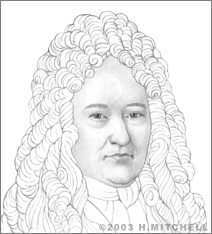Gottfried Leibniz
Gottfried Wilhelm Leibniz was born in Leipzig, Germany in 1646. His father died when he was just five years old. He was raised by his mother, whose religious and moral beliefs fostered his interest in philosophy. He taught himself to read Latin by age twelve and started studying Greek. In grade school, he learned about Aristotle’s logic and theory of categorizing knowledge, but he was dissatisfied with what he was learning and began working on his own ideas for ordering logical truths. This would later develop into his ability to perform difficult mathematical proofs.
In 1661, Leibniz entered the University of Leipzig. He studied philosophy and mathematics, graduating with a bachelor’s degree in 1663. The following fall, he started working toward a doctorate in law. Soon after, he was awarded his master's degree in philosophy, his mother died, and Leibniz continued with his studies, eventually earning a bachelor's degree in law. He was denied the doctorate in law at Leipzig, but he immediately went to the University of Altdorf, where he received a doctorate in law in February 1667.
Leibniz was interested in a variety of subjects, including the sciences, law, and literature. After completing his education, he worked for the Nuremberg Alchemical Society, followed by the courts in Mainz. He also dabbled in politics, organizing campaigns to persuade the French not to attack German areas and talking with philosophers about such topics as church reunification. In 1672, he began seriously studying geometry, mathematics, and physics in Paris. He also worked on determinants and on methods for solving systems of linear equations.
In 1676, Leibniz accepted an offer to fill the well-paid post of librarian in the ducal library in Hannover, Germany, a post that he retained for the rest of his life. This position afforded him ample leisure time with which he continued his mathematical research. He began organizing his system of differential calculus in 1674 and put it into a consistent and usable form in 1677. He published it in 1684. In 1686, he published a paper on integral calculus. He is credited with inventing these two mathematical subjects, though it should be noted that many historical accounts of his work include discussion of a long-disputed theory that he may have come up with some of his ideas after Isaac Newton did. Newton published his work on differential calculus at approximately the same time that Leibniz did, but it is said that Leibniz’s notation was far superior to Newton’s.
Leibniz also pursued mechanical studies, working on forces and weights and designing new types of hydraulic presses, windmills, lamps, submarines, clocks, carriages, water pumps, and a calculating machine. He is also credited with inventing the binary number system and for developing the theory that the earth was first molten.
During his career, Leibniz corresponded frequently with scholars around the world and was very active in setting up academic societies, contributing to the founding of the St. Petersburg and Vienna Academies, as well as the Brandenburg Society of Sciences, among others. He was also a member of The Royal Society of London and the Paris Academy.
Leibniz died on November 14, 1716 in Hannover.


